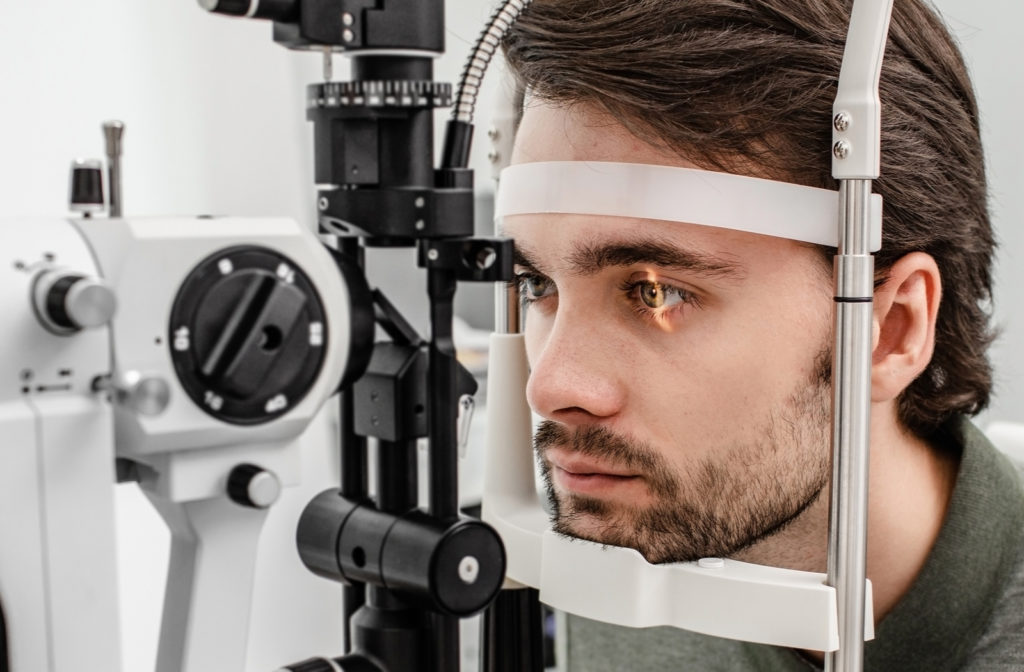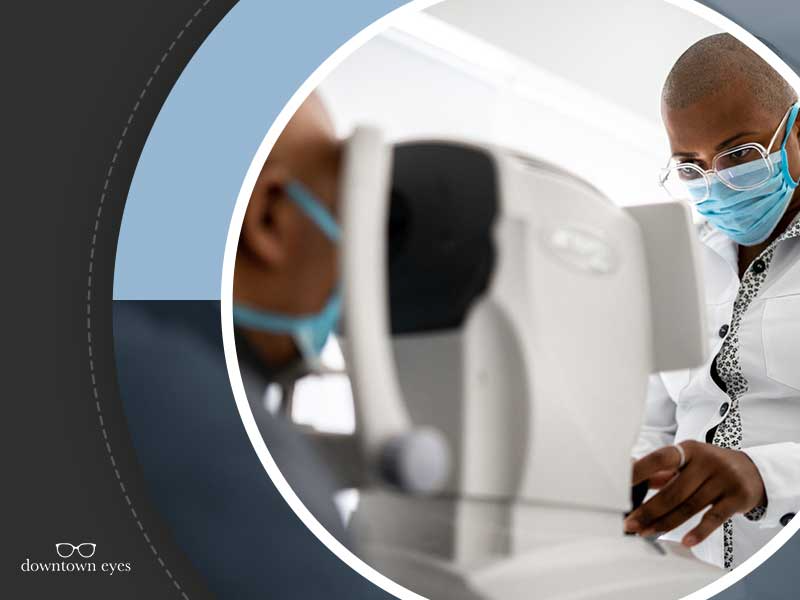Top-Rated Optometrist Montgomery for Clearer Vision
Top-Rated Optometrist Montgomery for Clearer Vision
Blog Article
The Importance of Routine Eye Examinations: Insights From a Seasoned Optometrist
Regular eye examinations function as a vital part of medical care that extends beyond mere vision modification. An experienced eye physician can give understandings right into how these examinations not just find usual eye problems but likewise expose underlying health and wellness concerns that might or else go unnoticed. The quiet development of conditions such as glaucoma and macular deterioration underscores the necessity of early discovery. Recognizing the regularity and value of these evaluations can ultimately influence one's long-term wellness trajectory, elevating the inquiry of exactly how typically individuals should prioritize their eye wellness in the context of general wellness.
Advantages of Routine Eye Exams
Although several people may forget the relevance of routine eye exams, these assessments play a crucial function in maintaining general health and wellness. Normal eye evaluations offer not only to examine vision but likewise to spot very early indicators of systemic health and wellness issues, consisting of diabetes and high blood pressure. By identifying these problems at their beginning, clients can obtain timely treatments, substantially boosting long-term results.
In addition, eye exams can assist in keeping track of existing health and wellness concerns, guaranteeing that any type of adjustments in vision or eye health are quickly addressed (optometrist). The evaluations allow for individualized referrals concerning glasses, lifestyle modifications, and protective procedures versus potential eye strain or damage
Beyond physical health and wellness, the advantages of normal eye tests encompass boosting quality of life. Enhanced vision promotes better performance in everyday tasks, from reviewing to driving, thereby contributing to greater independence and safety. Eventually, prioritizing eye examinations promotes an aggressive strategy to wellness monitoring, empowering individuals to organize their well-being. Regular check-ups are a necessary element of a detailed health care method, making sure that both vision and general health are preserved throughout life.
Common Eye Conditions Detected
Normal eye examinations are critical in detecting a variety of usual eye conditions that can substantially affect vision and total health. Among the most widespread problems recognized during these evaluations are refractive mistakes, including nearsightedness (nearsightedness), hyperopia (farsightedness), and astigmatism. These conditions commonly manifest as obscured vision and can be easily fixed with prescription glasses or call lenses.
Another common concern is glaucoma, a group of eye illness that harm the optic nerve, typically connected to enhanced intraocular stress. Early discovery is important as it can protect against irreversible vision loss.
Age-related macular degeneration (AMD) is an additional considerable problem that affects main vision, particularly in people over 50. Finally, diabetic retinopathy, a difficulty of diabetes, can cause extreme vision impairment if not checked frequently. Via detailed eye tests, these conditions can be recognized early, allowing for timely monitoring and treatment to protect vision and improve lifestyle.
Relevance of Early Detection
Very early discovery of eye problems plays an important duty in maintaining vision and preventing substantial wellness problems. Several eye conditions, blog such as glaucoma, diabetic retinopathy, and age-related macular deterioration, can proceed silently without noticeable signs and symptoms in their very early stages. By the time signs and symptoms show up, irreparable damages may have occurred, leading to long-term vision loss.
Routine eye examinations help with early medical diagnosis, enabling prompt treatment and treatment. For instance, dealing with elevated intraocular stress can stop the start of glaucoma, while taking care of blood sugar level levels can considerably decrease the risk of diabetic person retinopathy. Furthermore, conditions like cataracts can be effectively taken care of with medical intervention when identified early.

Exactly How Typically Should You See?
Identifying the frequency of eye exams is important for maintaining optimal eye health and vision. The basic referral for grownups is to have a detailed eye examination every one to two years, depending on individual threat variables and age.
People with details threat aspects, such as a family members background of eye illness, diabetic issues, or existing vision issues, may require more frequent assessments. Kids must have their initial eye examination at six months of age, adhered to by added examinations at age 3 and before entering college. Routine examinations throughout youth are essential as vision can transform swiftly throughout developing years.
Eventually, the frequency of gos to should be tailored per person's situations, including lifestyle, job-related risks, and any kind of pre-existing eye problems. Consulting with an eye care professional can give tailored referrals, ensuring that your eye health is on a regular basis kept an eye on and preserved.
Tips for Your Eye Examination
Getting ready for your eye exam can boost the efficiency of the go to and make certain a thorough analysis of your eye health and wellness. To optimize your time with the eye physician, it is essential to collect relevant details prior to your consultation. Begin by assembling a listing of any kind of medications you are currently taking, consisting of over the counter drugs and supplements, as these can impact eye health and wellness.
In addition, document any kind of signs you like it have actually experienced, such as obscured vision, discomfort, or frustrations. This information will certainly assist your optometrist in diagnosing potential concerns. If you put on glasses or call lenses, bring them along, also if you don't use them frequently. This will certainly help the physician examine any modifications in your vision.
It is likewise beneficial to have a family history of eye conditions at hand, as genetic factors can add to your eye wellness. Finally, consider scheduling your exam for a time when you are less rushed, allowing you to ask questions and discuss your concerns thoroughly. By preparing sufficiently, you guarantee that your eye examination is efficient and that your ophthalmologist has all the necessary information to provide the ideal care possible.

Final Thought
Routine eye exams play a critical duty in keeping both vision and general health. They help with the early detection of different eye conditions and systemic concerns, permitting timely treatment. The suggestions for regularity highlight the value of positive care. Carrying out easy preparatory review pointers can improve the examination experience. Inevitably, prioritizing thorough eye assessments adds considerably to the preservation of vision and the enhancement of lifestyle, underlining the need of regular eye treatment in preventative healthcare techniques.
Normal eye examinations are critical in discovering a range of common eye problems that can significantly influence vision and overall health and wellness.Establishing the regularity of eye exams is important for preserving ideal eye wellness and vision.Preparing for your eye test can boost the performance of the visit and guarantee an extensive analysis of your eye wellness (optometrist). By preparing adequately, you guarantee that your eye exam is productive and that your eye doctor has all the required information to offer the finest care possible
Eventually, prioritizing extensive eye assessments contributes substantially to the preservation of vision and the enhancement of high quality of life, underscoring the need of regular eye care in precautionary health care methods.
Report this page